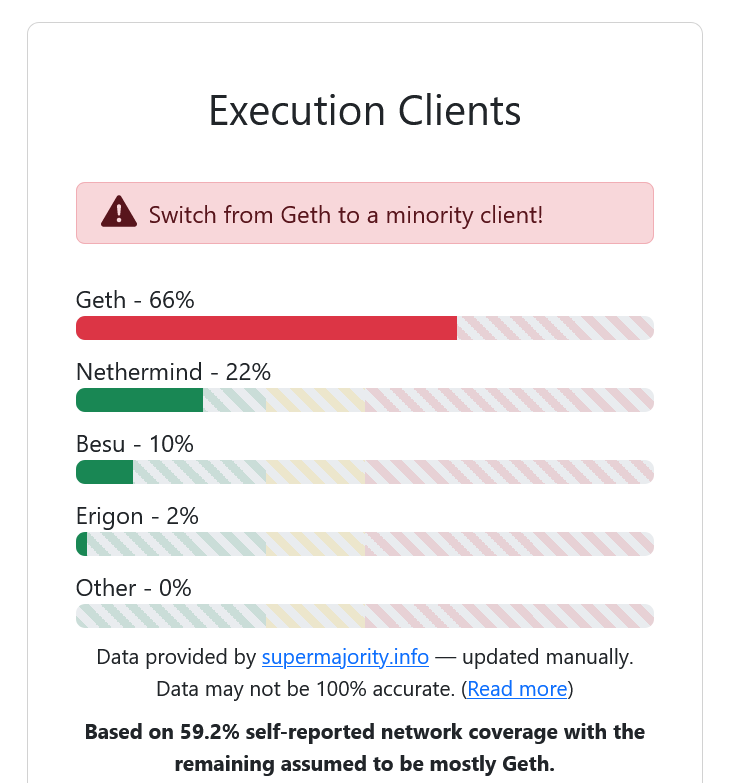Ethereum client landscape is changing as Geth’s market share dips to 66% following Coinbase’s transfer of nearly half its validators to Nethermind.
Although Geth, a prominent Ethereum execution client, has seen its market share drop from a high of 84% in late January to 66% as a result of Coinbase’s recent decision to convert almost half of its validators to Nethermind, one commentator asserts that the battle for decentralization is not yet over.
Ethereum’s Decentralization Drive
Because of the decreased reliance on Geth, Ethereum can solve a centralization risk that has been a source of concern for a long time. A significant bug in an execution client with a share of at least 66% could potentially prevent the chain from finalization, raising concerns.
Nevertheless, a pundit cautions that the business should not declare victory just yet. According to Client Diversity, Coinbase Cloud disclosed on March 22 that “roughly fifty percent” of its validators had shifted to Nethermind.
This helped bring the execution client’s market share up to 22 percent. The entire minority client share is approximately 34%, with Besu holding 10% of Ethereum validators and Erigon holding a 2% share.

Coinbase is also providing support for Erigon, which brings the total minority client share to approximately 34%. One of the most critical roles that execution clients on Ethereum play is in the management of transactions and the execution of smart contracts on the blockchain.
There is a consensus among experts that Geth is the most advanced client. A significant preference for it among Ethereum validators, on the other hand, has resulted in an imbalance in the diversity of execution clients over the past few years.
Lachlan Feeney, the founder and CEO of Labrys, an Ethereum infrastructure company, provided the following statement:”We can’t declare victory yet.”
Geth needs to move a “decent amount below the 66% threshold to account for any margin of error before we are confident that a supermajority bug isn’t possible,” according to Feeney, who asserts that Client Diversity’s methodology to generate its data is faulty.
Geth also needs to move to account for any margin of error. According to Feeney, we cannot recognize the “real victory” until no single client controls more than 33 percent of the company’s shares.
He stressed the significance of solo staking in diversifying execution clients, which would also protect those stakers from being affected by a problem on Geth that would require a supermajority.
Superphiz, an advocate for Ethereum decentralization, recently made statements suggesting that a fundamental flaw in Geth could potentially wipe away eighty percent or more of the Ether (ETH) staked on the network.
Currently, there are over 31.5 million Ether stakes, which according to Beaconcha, this is equivalent to approximately 113.5 billion dollars at the current price. Meanwhile, Coinbase has stated that it will continue to contribute to the decentralization of Ethereum by diversifying its own validator set.
“Ensuring the security of our customers’ assets and contributing to the resiliency of the Ethereum network are — and have always been — of paramount importance to us. Diversifying execution clients on our validators helps us accomplish both.”
Coinbase has indicated that it plans to “evenly distribute” its validators amongst Geth, Nethermind and Erigon throughout the long term.Feeney mentioned that Sigma Prime, Kiln, Octant, Lido, Ankr and Twinstake have also documented a decrease in reliance on Geth.












